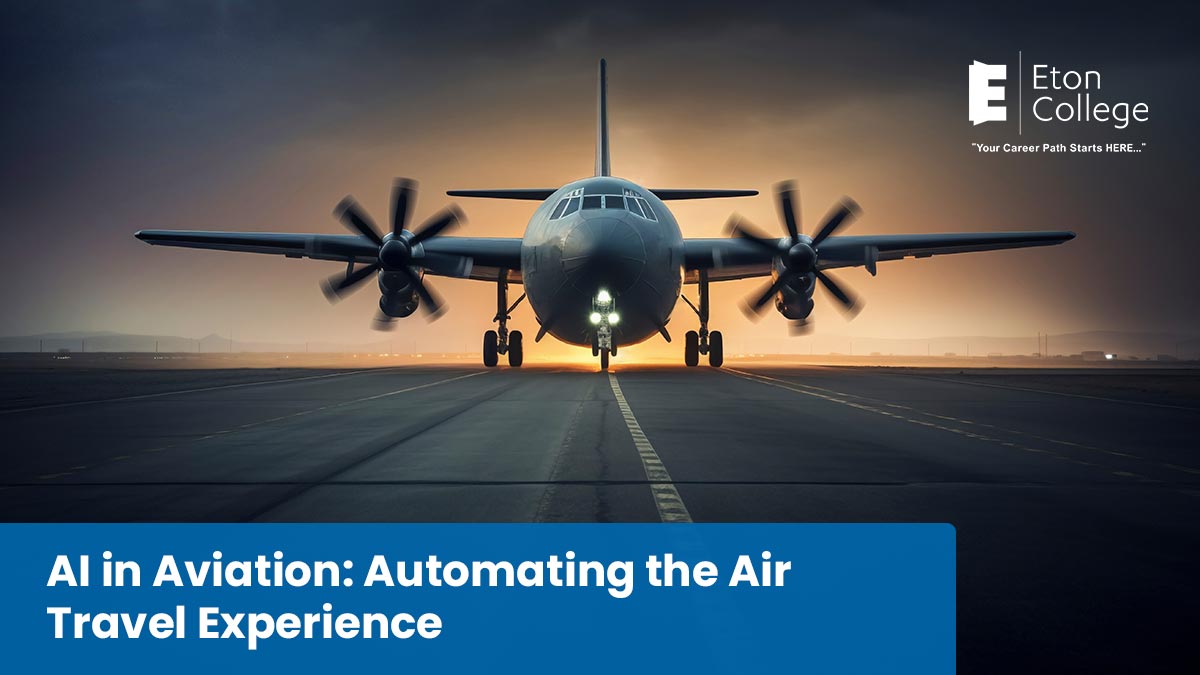- AI enhances airport efficiency by managing flight schedules, predicting maintenance needs, and reducing delays.
- Smart baggage tracking systems and facial recognition technology make check-in and boarding faster and more secure.
- AI-driven customer service platforms, like chatbots and virtual assistants, provide real-time support to passengers.
- Predictive maintenance powered by AI reduces technical failures and minimizes flight disruptions.
- Fully autonomous aircraft may be on the horizon, but for now, AI serves as a co-pilot, assisting human operators.
In recent years, Artificial Intelligence (AI) has made remarkable strides across industries, and aviation is no exception. AI is reshaping the way we travel, from the booking process to in-flight services, offering a more seamless, efficient, and personalized experience for passengers.
This blog explores how AI is revolutionizing aviation, particularly in enhancing flight automation and operational efficiency.
Streamlining Ground Operations
AI-powered systems are transforming airport operations, making ground services more efficient. From managing flight schedules to predicting maintenance issues, AI helps reduce delays and improve the overall passenger experience.
Smart baggage systems, for example, use AI to track luggage in real-time, reducing the chances of lost items. Additionally, AI-driven facial recognition technology is speeding up check-in and boarding procedures, making air travel smoother and more secure.
Moreover, aviation technology plays a crucial role in optimizing airport operations. AI-based traffic management systems analyze patterns and predict congestion, allowing airports to better allocate resources and reduce bottlenecks. These innovations not only save time but also cut down on operational costs, benefiting both airlines and passengers.
Optimizing Resource Allocation
Aviation technology plays a crucial role in optimizing airport operations, especially when it comes to resource allocation. AI-based traffic management systems analyze patterns and predict congestion, allowing airports to better manage air and ground traffic, reduce bottlenecks, and enhance overall efficiency.
These innovations not only save time but also cut down on operational costs. Airports and airlines benefit from better resource utilization, while passengers enjoy smoother experiences with fewer delays and disruptions.
Enhancing Passenger Experience with AI
AI is transforming the way passengers engage with airlines, providing seamless interaction throughout their journey. Virtual assistants, chatbots, and AI-driven customer service platforms offer real-time support, from checking flight statuses to handling special requests, making the experience more convenient.
Additionally, AI helps airlines personalize passenger experiences. Algorithms tailor offers like seat upgrades and meal preferences, enhancing customer satisfaction and making each flight more enjoyable.
Flight attendants are also seeing the benefits of AI. Wearable devices and AI-powered apps help cabin crew monitor passenger preferences and health conditions, enabling personalized care while allowing the crew to focus on key safety responsibilities.
Flight Automation and Safety
AI’s impact on flight automation is one of the most transformative developments in aviation technology. It assists pilots by automating routine tasks like monitoring flight paths, fuel levels, and weather conditions.
By leveraging AI, airlines can improve fuel efficiency and make real-time route adjustments, optimizing performance and safety. These capabilities help airlines stay adaptable during flights and reduce potential risks.
AI-driven systems also enhance safety by analyzing sensor data and predicting issues before they become serious. This proactive approach allows airlines to conduct timely maintenance, reducing technical failures and minimizing disruptions.
The Future of AI in Aviation
As AI continues to evolve, its role in aviation will only expand. The future may see fully autonomous aircraft, though this remains a topic of debate due to safety and regulatory concerns. For now, AI serves as a powerful co-pilot, assisting human operators and enhancing the overall safety and efficiency of air travel.
The widespread use of AI in aviation technology is transforming how the industry operates, from the ground to the sky. With advancements in flight automation, airports, airlines, and passengers are benefiting from a more efficient and personalized air travel experience.
As we look to the future, the role of AI in aviation is set to grow, offering exciting possibilities for both flight attendants and passengers alike.
For those looking to enter the aviation field, understanding AI’s role is essential. Programs like Eton College’s Flight Attendant Preparation Program are designed to equip future aviation professionals with the skills and knowledge needed to succeed in an AI-driven world. The future of aviation is here, and it’s powered by AI.
FAQs
- How is AI improving the passenger experience in aviation?
AI enhances the passenger experience by providing personalized services, such as virtual assistants, chatbots for real-time support, and tailored offers like seat upgrades and meal preferences.
- What role does AI play in flight automation?
AI assists in automating routine tasks such as monitoring flight paths, fuel levels, and weather conditions, helping pilots optimize flight performance and safety.
- What impact does AI have on airport operations?
AI improves airport efficiency by managing flight schedules, optimizing resource allocation, and using technologies like facial recognition for faster check-in and boarding processes.
- Can AI fully replace human pilots in the future?
While AI can assist with many tasks, fully autonomous aircraft are still a topic of debate due to safety and regulatory concerns, with human pilots remaining essential for now.
- What is predictive maintenance in aviation, and how does AI assist with it?
Predictive maintenance uses AI to monitor and analyze aircraft data in real-time, identifying potential maintenance issues before they cause disruptions, leading to fewer technical failures.




